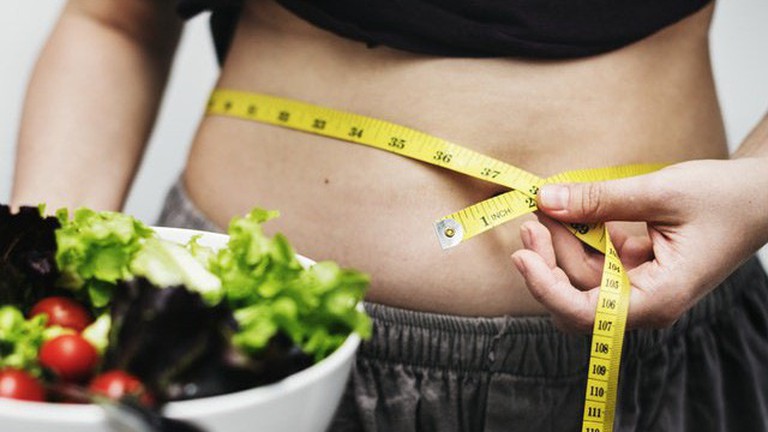According to endocrinologists, two of the most important hormones to focus on during natural weight loss and energy balance are ghrelin and leptin.

Many experts call ghrelin and leptin „hunger hormones“ because they are responsible for increasing or decreasing our appetite.
Although certain weight loss programs that involve the consumption of artificial hormones – such as those that use human chorionic gonadotropin (HCG) to increase fat burning – can be dangerous, there are safe and effective steps we can take to manipulate our natural hormones from the body. hunger and reach our weight loss goal.
It may seem like the world is against you when it comes to achieving sustainable weight loss, but it’s important to understand that we have great control over our hormones as they respond reliably to changes in diet, exercise, and exercise. stress that we perform.
We do not need to resort to unnatural and harmful methods to lose weight quickly and reach our ideal weight; instead, we should focus on establishing a healthy eating environment that encourages nutrient-rich diets, managing stress, moving our bodies consistently, and making good long-term food choices.
What is ghrelin?
Ghrelin is a hormone that increases appetite, it is considered a „growth hormone releasing peptide“ (or GHR). Since ghrelin makes you hungry, levels of this hormone tend to rise before meals and drop after meals.
How is ghrelin secreted? It is produced in the stomach and fluctuates throughout the day, depending on food intake. As a peptide hormone, it is produced by ghrelinergic cells located in the gastrointestinal tract, which communicate with the central nervous system, especially the brain.
Once produced in the stomach, increased ghrelin levels send a signal to the brain that makes you feel hungrier. Considered the only appetite-stimulating hormone in humans, ghrelin is one of the main contributors to people “craving” and potentially causing them to overeat.
What is the effect of ghrelin on growth hormone and metabolism?
Ghrelin and growth hormone related secretagogues increase body weight and fat mass. One way they do this is by activating receptors in a part of the brain called the arcuate nucleus, which controls sensitivity to leptin and insulin.
Ghrelin can sometimes override the signals sent from the gastrointestinal tract to the brain that tell you to stop eating, such as those caused by gastric distention (pressure exerted on the stomach as it expands).
Ghrelin also appears capable of contributing to cellular changes, including alterations in the endothelial cells that line blood vessels.
According to research, ghrelin reduces fat utilization and is a vital component of the sense of reward caused by food controlled by the brain’s pleasure reward system.
Ghrelin levels are negatively correlated with weight, so diet (especially severe caloric restriction) tends to increase ghrelin production. Ghrelin has been found to play an important role in short-term food induction and long-term weight gain, but the hormone has other functions as well, including influencing:
- Regulation of growth hormone and insulin secretion.
- Glucose and lipid metabolism.
- Gastrointestinal motility.
- Blood pressure and heart rate.
- And neurogenesis (the process in which neurons are generated from neural stem cells).
Additionally, more ghrelin is released directly in response to stressful situations, which explains why so many people tend to eat when stressed. By perpetuating the stress cycle, ghrelin contributes to weight gain by maintaining a person’s stress levels and causing strong urges to eat or overeat.
What is the difference between leptin and ghrelin?
Ghrelin and leptin work together to facilitate eating, energy balance, and weight control. Leptin is a hormone produced by fat cells that decreases appetite. Essentially it does the opposite of ghrelin, which increases appetite. Both hormones play a role in maintaining body weight.
Within the brain, the same area that contains ghrelin receptors (called ghrelin/growth hormone secretagogue receptors, or GHS-Rs) also contains leptin receptors. Because the body produces leptin based on the percentage of body fat, weight gain causes leptin levels in the blood to increase.
But the opposite is also true: losing weight will cause your leptin levels to drop (and often lead to more hunger). Unfortunately, overweight and obese people are generally believed to be „leptin resistant,“ which contributes to increased weight gain and difficulty losing excess weight as they require more food to feel „full“ or satiated.
However, there is still much to learn about how leptin resistance and increased ghrelin can contribute to obesity.
To summarize the main functions of ghrelin, here are three points to remember:
- Ghrelin is a fast-acting hormone that plays a vital role in increasing appetite, initiating meals, and contributing to weight gain.
- Ghrelin works together with another hormone called leptin to control body weight. Leptin generally mediates long-term regulation of energy balance by suppressing appetite and food intake, which induces weight loss (although not in the case of obesity).
- Both hormones can be controlled naturally, primarily through smart dietary choices, exercise, getting enough sleep, and managing stress.
How to make ghrelin, your hunger hormone, work for you?
How can you lower your ghrelin levels? Here are six steps you can take to reduce ghrelin and control your appetite:
1. Do not restrict calories too much (that is, avoid the implementation of „strict diets“)
Ghrelin levels will increase if you eat insufficiently, which is one of the reasons that dieting makes most people very hungry. On the other hand, overeating causes ghrelin levels to drop, but this shouldn’t be the goal either (unless you’re trying to gain weight).
The fact that being in a calorie deficit makes you feel hungrier is one of the reasons why trying to diet to lose weight is so difficult. Fortunately, however, it has been found that certain types of eating habits can help control ghrelin , including eating lots of nutrient-dense, unprocessed foods and getting enough fiber and protein.
Ghrelin levels should drop significantly after each meal, and stay low for about three hours or more before you start to feel hungry again.
If you notice that you are hungry soon after eating, or that you frequently want to eat something throughout the day, consider whether you are consuming enough calories overall. You may be able to afford to increase your intake of protein, healthy fats, or complex (unrefined) carbohydrate fiber if you are severely restricting one of these macronutrients.
Eating enough healthy foods to maintain your activity level and feeling energized will prevent you from entering or staying in the „hunger state“ that will only increase your appetite.
2. Eat enough protein
Even if someone restricts their calorie intake, eating a higher proportion of protein foods can help control your appetite.
A 2006 study focused on the effects of a protein-rich meal on the postprandial ghrelin response states that „the most satiating macronutrient appears to be protein.“
When study participants ate a high-protein breakfast, they experienced a decrease in their postprandial ghrelin concentrations more strongly compared to when they ate a high-carbohydrate breakfast.
The researchers found evidence that high-protein meals had an effect on glucose-dependent insulinotropic polypeptides, which mediated the ghrelin response. Additionally, high-protein meals were more effective in slowing gastric emptying, prolonging feelings of fullness.
Other studies point to similar findings on how protein can contribute to weight loss: protein tends to prevent hunger, prevents loss of muscle mass during a diet, increases the secretion of satiety hormones, increases the thermal effect of digestion of food and improves glucose homeostasis.
3. Get some exercise, especially high intensity interval training (HIIT)
For years, generic weight loss advice offered by most healthcare providers focused on low to moderate aerobic activity, such as walking or running for 30 to 60 minutes every day.
But research from the last decade has reported that after performing these types of exercises, ghrelin increases (and therefore increases appetite) and also that leptin decreases, making this notion completely obsolete.
Rather than doing „steady state cardio“, High Intensity Interval Training (HIIT) is one of the best ways to control hunger and the way we eat to burn belly fat and manipulate ghrelin and leptin to improve our chances of losing weight.
HIIT can also increase muscle mass, which means that when you eat more, you can use the extra calories without increasing your fat levels. In a study, the hormone levels of several individuals who participated in a form of HIIT training (i.e., 30-second sprint on a cycle ergometer that controls low or high intensity) showed that:
- Total ghrelin concentrations decreased after a high-intensity sprint and were significantly lower after 30 minutes of recovery than before exercise, suggesting that high-intensity training may not only contribute to weight loss, but also Helps curb appetite in the long run.
- Growth hormone concentrations (attributed to weight loss) were higher in the high intensity group than in the low intensity group, suggesting that high intensity training affects hormones other than ghrelin.
4. Get a good night’s sleep (go to bed early and get up early, so you can exercise)
Getting enough sleep (usually around 7 to 9 hours a night for most adults) is associated with better ghrelin and leptin management. In a study involving 12 young men it was shown that sleep deprivation was associated with increased ghrelin levels, appetite and hunger compared to when men slept for longer periods (up to 10 hours per night).
To get the most out of your exercise routine (especially if your workouts are intense) and to better control your ghrelin and leptin levels, it has been shown that it is best to exercise first thing in the morning if possible. Exercising on an empty stomach can control glucose tolerance and insulin sensitivity , which are related to ghrelin production.
In addition to helping to prevent type 2 diabetes and lose weight, exercising early in the day is known to help regulate your appetite, especially when it comes to controlling cravings and the desire for unhealthy snacks.
5. Practice stress management
In addition to making dietary changes and getting enough exercise, it’s important to pay attention to the level of stress you’re dealing with. The journal recently published an article evaluating the effects of combining exercise, sleep, and stress management on hormones.
The study researchers concluded that „behavioral interventions could offer a practical and cost-effective method of reducing or stabilizing ghrelin levels after initial weight loss to improve weight loss maintenance.“
In other words, if you want to achieve your weight loss goals and then effectively maintain a healthy weight in the long term, you have to deal with your stress levels first.
Chronic stress is likely to increase appetite, mostly thanks to „comfort foods“ and contribute to other unhealthy habits such as overeating, eating processed foods, not making time to cook at home, possibly drinking more alcohol, bad habits sleep and sedentary lifestyle.
A good tip to reduce your stress is to end the day positively by practicing some Tai Chi or yoga at night, which will help you get a good night’s sleep and also prepare your body for the morning workout the next day. There are many ways to manage stress, but ultimately different techniques will work for different people.
Meditation, journaling, spending time outdoors, maintaining positive relationships, getting plenty of rest, and having an anti-inflammatory diet are some of the best ways to keep your stress levels low and reverse the cycle of stress that contributes to the increase. of weight.
6. Avoid highly addictive processed foods
Foods that have been refined and processed to taste exceptionally good are generally high in calories and also often low in nutrients. They are called „very tasty“ foods (or sometimes „ultra-processed foods and beverages“) by obesity and nutrition experts as they tend to cause overconsumption due to how they activate reward centers in the brain.
Normally, when we eat some food, chemical / hormonal messages are sent from our digestive tract to our brain and other parts of our body to tell us that we have eaten enough and stop eating.
But research suggests that when we give ourselves the opportunity to eat highly processed, calorie-dense foods, this feedback system doesn’t work as well. Essentially, it appears that the human brain is „designed“ to seek out and enjoy high-calorie foods, so including too many of them in your diet can interfere with appetite regulation.
What types of foods tend to increase your appetite and risk of overeating the most? Some examples include:
- Cakes, donuts, cookies, pies, brownies, and other goodies.
- Soda and sugary drinks.
- Pizza.
- White bread, rolls, pita, etc.
- Chocolate, sweets and ice cream.
- Salty snacks like French fries, pretzels, and chips.
- Other fried foods.
It’s so easy for us to go over our calorie limit and stay „hungry“ when we eat foods rich in refined grains, added sugar, added fats, and synthetic ingredients, especially when these tempting attributes are combined.
On the other hand, eating a whole food diet, including one with lots of vegetables, fruits, proteins like eggs or fish, healthy fats like avocado or coconut, etc., is the best way to naturally regulate your appetite as these foods They are high in fiber, low in calories, have many nutrients and, in general, make you better able to control your desire to continue eating.
Precautions Regarding Hunger Hormones and Weight Loss
While it’s good to take steps to naturally balance ghrelin or leptin levels, trying other weight loss programs that involve the use of artificial hormones is not recommended.
Manipulating hormones to increase weight loss is not a new concept. In the 1950s, the medical and scientific communities began to suggest artificial hormone therapy to help people lose weight.
Topping the list of these weight loss programs is one of the most controversial and controversial tricks: the use of human chorionic gonadotropin (HCG), a hormone produced during pregnancy that helps release a woman’s fat stores to support your baby’s growth.
HCG stimulates the hypothalamus to start fat metabolism, which provides nutrients for the baby. But take the baby out of the equation and those nutrients turned to fat need a place to go . The HCG diet supposedly helps men and women achieve „miraculous“ weight loss through a combination of HCG intake and a diet restricted to only 500–800 calories per day.
Basically, this is a starvation diet. The theory behind this misuse of hormone therapy is that the extra adipose tissue (fat) released into the bloodstream supplements the calories that people do not consume each day, helping dieters lose up to almost a kilo per day.
According to the Mayo Clinic, two important facts are crucial to understanding this type of hormone therapy for weight loss:
- The HCG diet is not safe and does not work in the long term, as most people will regain the weight they initially lost.
- The Food and Drug Administrationhas advised people „to stay away from over-the-counter weight loss products that contain HCG.“






